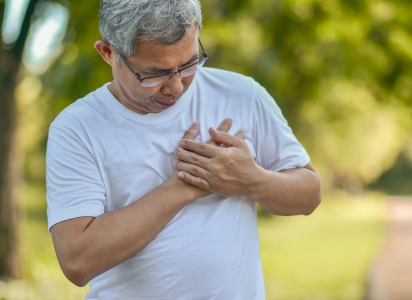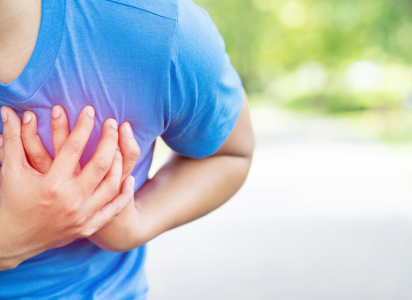Coffee is one of the world’s most popular beverages with millions of people indulging in a cup or two every day. Coffee has a number of benefits, including antioxidants, energy-boosting properties, and improved concentration.
However, rumors have circulated for years about the negative effects of coffee consumption on the heart and circulatory system but it’s more than a rumour: years ago, when I started drinking coffee, several mugs a day, I started experiencing heart palpitations. So imagine my surprise when one of my blog readers actually submitted this question to me.
In this post, I’ll explore this topic in greater depth and determine if there is any truth to this claim.
Can Coffee Really Cause Pain in the Heart?

First, let’s look at what causes heart pain. Cardiac pain typically occurs when the heart can’t get enough blood and oxygen usually due to blockages or narrowed arteries. This condition is known as angina and is a common symptom of heart disease.
In some rare cases, coffee consumption may cause heart palpitations which can feel like heart pain or irregular heartbeat. This happens because caffeine is a stimulant that increases heart rate and can cause the muscles to contract more forcefully than normal.
However, this doesn’t mean that coffee causes heart pain. In fact, studies have shown that moderate coffee consumption may actually reduce the risk of heart disease. Another study found that people who drank 1-3 cups of coffee daily had a lower risk of cardiovascular diseases such as stroke and heart attack.
Refrain From Excessive Consumption

While moderate coffee consumption may be beneficial for heart health, excessive consumption is not recommended.
Consuming large quantities of coffee (more than 6 cups a day) can increase the risk of heart disease. Caffeine overdose can also cause symptoms such as heart palpitations, rapid heartbeat, and increased blood pressure. People with pre-existing heart conditions should be especially cautious about their caffeine consumption.
It should also be noted that the way coffee is prepared can affect its health benefits. Coffee preparation methods that involve boiling or using a French press may increase the risk of heart disease because they release higher amounts of a compound called cafestol.
This compound can increase cholesterol levels and contribute to the formation of plaque in the arteries. Filtered coffee, on the other hand, removes much of the cafestol and is associated with lower cholesterol levels and reduced risk of heart disease.
Can Coffee Cause Chest Pains?

No, coffee itself does not directly cause chest pains or heart pain.
However, excessive consumption of coffee can lead to symptoms such as heart palpitations and increased blood pressure, which may be uncomfortable for some people. People with pre-existing heart conditions should avoid high quantities of caffeine altogether.
Folks who are prone to experiencing chest pains should opt for filtered coffee rather than boiled or French press options to minimize the risk of developing coronary artery disease.
Lastly, decrease your intake of coffee (it’s a diuretic!) and make sure you are hydrating well. This is the problem I had when I was drinking 4-6 cups of coffee a day and not drinking any water at all and then playing sports.
Can Caffeine Cause Heart Attack Like Symptoms?
Yes, caffeine can cause some heart attack-like symptoms such as rapid heartbeat and chest pains. However, these symptoms are usually mild and will go away after a few minutes of rest or reduced consumption of caffeine. If the symptoms persist or become worse, it is important to seek medical advice immediately.
Why is Caffeine Hard on Your Heart?

Caffeine is a stimulant that can increase heart rate and blood pressure, causing uncomfortable symptoms such as heart palpitations.
In large amounts, caffeine can also cause arrhythmia or an irregular heartbeat. People with pre-existing heart conditions should avoid high quantities of caffeine to minimize the risk of developing cardiovascular problems.
Can Coffee Cause Heart Pressure?
Yes, excessive intake of coffee may cause a temporary increase in blood pressure. High amounts of caffeine can also affect the way your heart pumps and lead to arrhythmias or an irregular heartbeat. People with pre-existing heart conditions should avoid high quantities of caffeine to minimize their risk of developing cardiovascular problems.
How Long Does it Take Your Heart to Recover From Caffeine?
The effects of caffeine on the heart are usually temporary and the body will return to normal within a few hours. However, I suggest that if you’ve never experienced this before, that you should get checked out.
Conclusion
So what’s the verdict? Can coffee cause heart pain? While excessive coffee consumption and caffeine overdose can lead to heart palpitations and other symptoms, moderate coffee consumption may actually reduce the risk of heart disease.
It’s important to consume coffee in moderation and avoid preparation methods that release high amounts of cafestol. If you are experiencing heart palpitations or heart pain, you should definitely discuss this with your doctor and make some changes to see if it gets better.